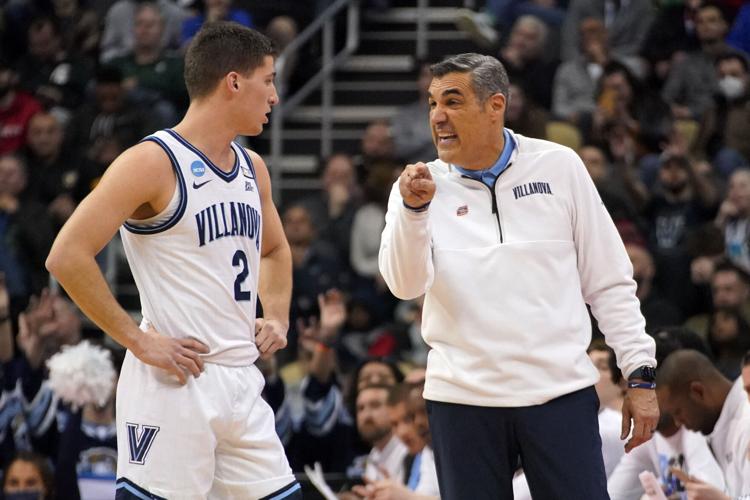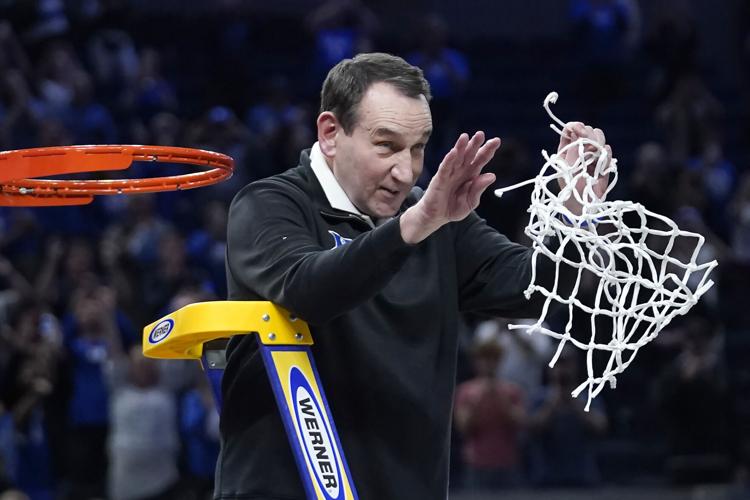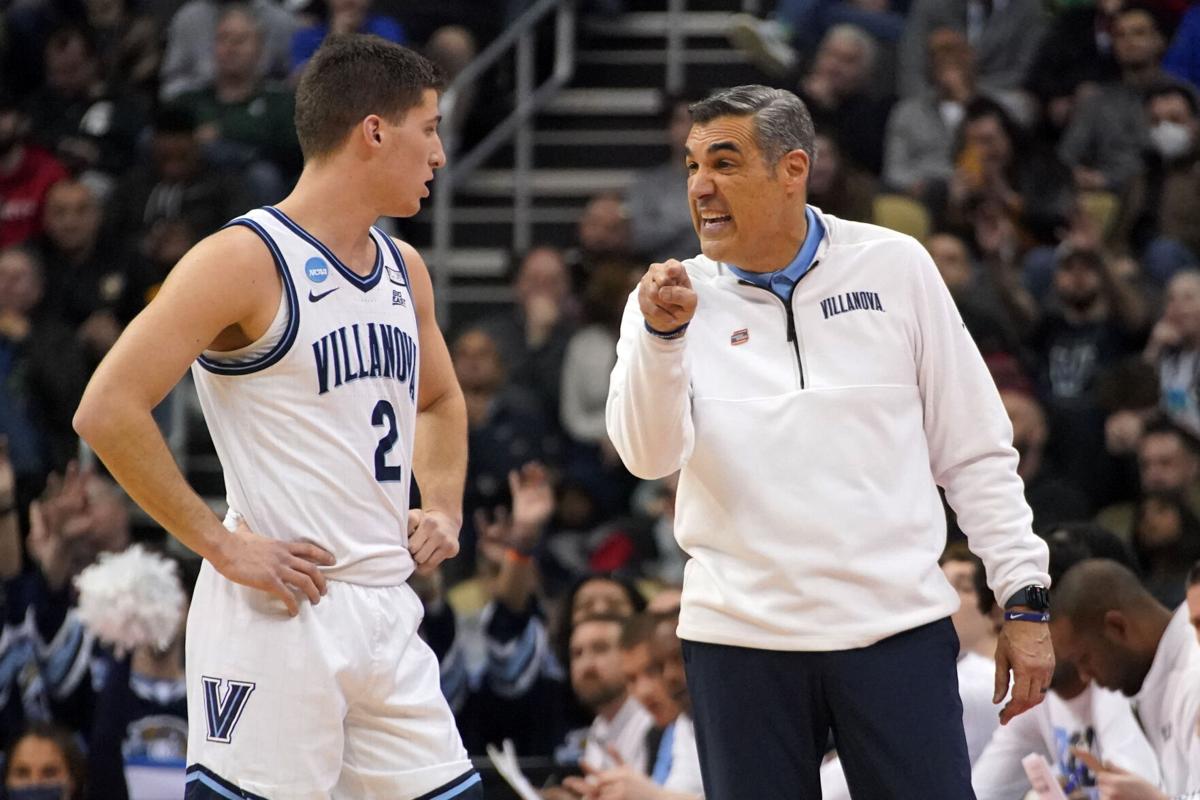Duke, Kansas, North Carolina and Villanova are playing a game with which Arizona and the Pac-12 are unfamiliar.
This year’s Final Four teams are playing basketball of the 1980s and 1990s, not basketball of the 21st century, and it has nothing to do with X’s and O’s.
While the non-blue bloods scramble to reshape their rosters year after year — acquiring transfers and foreign players in historically unprecedented numbers — the Blue Devils, Tar Heels, Wildcats and Jayhawks remain in an old-school comfort zone.
It is an advantage like few others in college basketball.
Get this: Duke’s top seven players (minutes played) include no transfers, no foreigners. What’s more, Mike Krzyzewski has built such a recruiting dominion that five of those top seven players are either from North Carolina or Virginia. The only time Coach K had to leave the East Coast to sign a rotation player for his ’22 Final Four team was to raid Pac-12 territory — Seattle — to get difference-making freshman Paolo Banchero.
Banchero didn’t even visit a Pac-12 school; his other official visit was to Tennessee.
Imagine Tommy Lloyd’s seven-man rotation stocked with players from Arizona and New Mexico, and Lloyd being able to spend more offseason time developing his players on campus, and with his wife and three children, than to spend much of the summer recruiting in Europe, scrolling the transfer portal, trying to keep up with Duke, Kansas and Carolina.
To the masses, college basketball has become a never-ending game of mix-and-match, but to the Blue bloods it's still a game of comfort and fit.
It’s the same at Villanova, where Jay Wright has been unequivocally college basketball’s most successful coach of the last decade. Six of Villanova’s seven rotation players are from Pennsylvania or nearby Washington D.C., Massachusetts or Virginia. No foreign players. The only transfer is Caleb Daniels from Tulane.
Roster management at Villanova correlates to familiarity and consistency, and almost no need to rebuild. That’s something no Pac-12 team can match.
This year’s combined seven-man rotation rosters at Duke, Carolina, Villanova and Kansas have just three transfers and no foreign players.

Mike Krzyzewski’s final Duke team was built in a way that no Pac-12 team could hope to replicate.
The Pac-12 this year deployed 32 transfers and 36 foreign players. It’s a different game.
The Pac-12 plays basketball by the seat of its pants. Duke, Kansas, ’Nova and Carolina play with house money.
One of the reasons Oregon faded from relevance this season is that Dana Altman broke in transfers from Syracuse, Rutgers and Oklahoma and team harmony/chemistry blew to smithereens.
It was similar to Arizona State’s exasperating season. Bobby Hurley inserted transfers from Boston College, Toledo and Illinois State into what preseason charts projected as an NCAA Tournament team. Instead, the 14-17 Sun Devils came off as a chaotic, whoever-gets-the-ball-first-shoots squad.
By comparison, Kansas coach Bill Self plucked ASU’s only high-level player, guard Remy Martin, and mixed him into the fabric of a share-the-ball Jayhawk squad. Martin wasn’t even KU’s leading scorer. He averaged a modest 8.6 points per game, far below his back-to-back 19 points-per-game seasons at ASU.
Self wasn’t remaking his “old’’ roster on the run, as most Pac-12 teams do. He was adding a final piece, and Martin has been a perfect fit. Of KU’s seven rotation players, four are seniors. None are freshmen. No wonder it is in the Final Four.
Beyond that, Kansas was built from Midwest soil. KU’s two leading players, Ochai Agbaji and Christian Brown, are from the Kansas City metro area. Another, Dajuan Harris, is from across the border in Missouri. Self’s three assistant coaches — Kurtis Townsend, Norm Roberts and Jeremy Case — have all been at KU for at least seven years.
Familiarity works in college basketball, as Kansas, Villanova and Duke exhibit so well.
North Carolina’s seven-man rotation is similarly built on stay-in-the-family values. The Tar Heels have just one transfer in that group, former Oklahoma Sooner big man Brady Manek. No freshmen are in UNC’s rotation. The Tar Heels’ roster includes seven North Carolinians.
At Villanova, Wright’s three assistant coaches all pump ’Nova blood. Mike Nardi was a four-year starter for Wright; Dwayne Anderson was captain of Villanova’s 2009 Final Four team; George Halcovage has been at Villanova since 2008.
They don’t need directions on the Road to the Final Four.
The sobering truth is that only a few schools can play the continuity game in college basketball, avoiding yearly roster overhauls and transfer-heavy lineups that can disrupt team bonding. The best example is probably Kentucky.
John Calipari’s Wildcats haven’t been to the Final Four since 2015 and lost in the first round this season. His roster management has been wobbly, to say the least. This year the No. 2-seeded Wildcats’ seven-man rotation included transfers from Rhode Island, West Virginia, Davidson, Georgia and Creighton. Oops.
No stability usually equals no Final Four.
The game began to irretrievably change about the time Sean Miller was hired by Arizona for the 2009-10 season. In Miller’s first season at Arizona, there were only three transfers in the Pac-12: Cal’s Jamal Boykin, Oregon State’s Daniel Deane and ASU’s Eric Boateng.
This year there were 32.
The single non-pandemic outlier of the Pac-12’s last dozen seasons was Oregon’s 2017 Final Four team. The Ducks’ seven-man rotation included five lettermen — Jordan Bell, Dillon Brooks, Tyler Dorsey, Chris Boucher and Casey Benson – elite freshman recruit Payton Pritchard and one hand-picked transfer, Dylan Ennis.
But since that team scattered, Oregon has deployed 15 transfers, from every conceivable point of the basketball map, including two each from Rutgers, UNLV and New Mexico, stalling what seemed to be Oregon’s inevitable rise to the top of Pac-12 basketball.
That’s not the way Duke, North Carolina, Kansas and Villanova do it.






